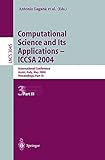Computational Science and Its Applications – ICCSA 2004 [electronic resource] : International Conference, Assisi, Italy, May 14-17, 2004, Proceedings, Part III / edited by Antonio Laganá, Marina L. Gavrilova, Vipin Kumar, Youngsong Mun, C. J. Kenneth Tan, Osvaldo Gervasi.
Material type: TextSeries: Lecture Notes in Computer Science ; 3045Publisher: Berlin, Heidelberg : Springer Berlin Heidelberg, 2004Description: CVI, 1044 p. online resourceContent type: text Media type: computer Carrier type: online resourceISBN: 9783540247678Subject(s): Computer science | Information theory | Information systems | Computer science -- Mathematics | Computer Science | Programming Techniques | Theory of Computation | Mathematics of Computing | Information Systems and Communication Service | Computer Applications | Computational Mathematics and Numerical AnalysisAdditional physical formats: Printed edition:: No titleDDC classification: 005.11 LOC classification: QA76.6-76.66Online resources: Click here to access online
TextSeries: Lecture Notes in Computer Science ; 3045Publisher: Berlin, Heidelberg : Springer Berlin Heidelberg, 2004Description: CVI, 1044 p. online resourceContent type: text Media type: computer Carrier type: online resourceISBN: 9783540247678Subject(s): Computer science | Information theory | Information systems | Computer science -- Mathematics | Computer Science | Programming Techniques | Theory of Computation | Mathematics of Computing | Information Systems and Communication Service | Computer Applications | Computational Mathematics and Numerical AnalysisAdditional physical formats: Printed edition:: No titleDDC classification: 005.11 LOC classification: QA76.6-76.66Online resources: Click here to access online  E-BOOKS
E-BOOKS
| Current library | Home library | Call number | Materials specified | URL | Status | Date due | Barcode |
|---|---|---|---|---|---|---|---|
| IMSc Library | IMSc Library | Link to resource | Available | EBK3167 |
Workshop on Computational Geometry and Applications (CGA 04) -- Track on Computational Geometry -- Track on Adaptive Algorithms -- Track on Biology, Biochemistry, Bioinformatics -- Track on Cluster Computing -- Track on Computational Medicine -- Track on Computational Methods -- Track on Computational Science Education -- Track on Computer Modeling and Simulation -- Track on Financial and Economical Modeling -- Track on Mobile Computing Systems.
The natural mission of Computational Science is to tackle all sorts of human problems and to work out intelligent automata aimed at alleviating the b- den of working out suitable tools for solving complex problems. For this reason ComputationalScience,thoughoriginatingfromtheneedtosolvethemostch- lenging problems in science and engineering (computational science is the key player in the ?ght to gain fundamental advances in astronomy, biology, che- stry, environmental science, physics and several other scienti?c and engineering disciplines) is increasingly turning its attention to all ?elds of human activity. In all activities, in fact, intensive computation, information handling, kn- ledge synthesis, the use of ad-hoc devices, etc. increasingly need to be exploited and coordinated regardless of the location of both the users and the (various and heterogeneous) computing platforms. As a result the key to understanding the explosive growth of this discipline lies in two adjectives that more and more appropriately refer to Computational Science and its applications: interoperable and ubiquitous. Numerous examples of ubiquitous and interoperable tools and applicationsaregiveninthepresentfourLNCSvolumescontainingthecontri- tions delivered at the 2004 International Conference on Computational Science and its Applications (ICCSA 2004) held in Assisi, Italy, May 14–17, 2004.


There are no comments on this title.